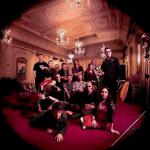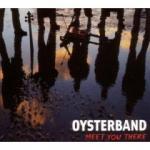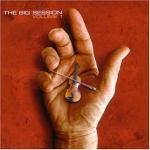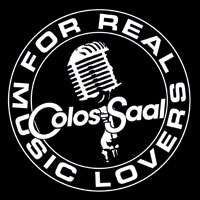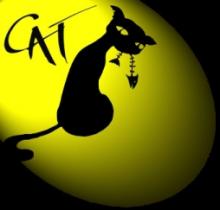Wo heutzutage Folk draufsteht, ist unter Umständen alles Mögliche und noch viel mehr drin. Dass weniger manches Mal mehr ist, das beweist die britische OYSTERBAND.
Band:
BiografieHere´s what the bandits think fit to print about themselves (you might get a different opinion from their partners/neighbours/bank managers/dogs). For an outsider´s view, see further below..... Oysterband
John Jones
Alan Prosser
Chopper
Lee
Ian Telfer
lead vocal, squeezeboxes
guitars, mandolin, vocal
bass, cello, vocal
drums, vocal
fiddle, concertina
IAN TELFER Born in Falkirk, a place he has revisited just once, on a wet Wednesday (and it was closed). Each male generation of his father´s family either worked in a bank or went to sea, which might explain a few things if you believe in genetics as destiny. Grew up in Aberdeen, and in more egalitarian days, when such things were easier (hooray), was the first in his family to go to university, studying Lang´n´Lit at Aberdeen, which he loved, and Kent at Canterbury, which he did not. Flunked out of an attempted doctorate (the words "George Meredith" can still bring him out in hives) and dossed around as waiter, bartender, overeducated skinhead until "Music saved my life!" Was the fiddler in artfolk band Fiddler´s Dram (with Alan and others) until their attempt at a career was blown by a huge novelty-hit single, "Day Trip To Bangor" - the kind of success you don´t easily recover from. Fiddler´s Dram did one more tour then gratefully took the money (and the gold discs) and ran, in Ian´s and Alan´s case into what was then an aspiring dance outfit, The Oyster Ceilidh Band......
Writes much of the band´s output of lyrics, generally in consultation with John. Has been banned, er, democratically outvoted by other Oysters from playing sax on stage. Presently lives in a Cypriot/Kurdish village in north London, where his immediate neighbours are Jamaican, Pakistani, Somali, Greek Cypriot, Chinese and South American, and he likes it very much, thanks, apart from the din of police helicopters. Recently bought a Turkish dictionary to try to keep up with the political grafitti. Currently into: the fiddle recordings of James Byrne, Eritrean cooking, the poems of John Berryman and the alco-noir ´tec novels of James Crumley; though only one of these might have an influence on future song-writing.
CHOPPER Scottish mum, English dad, Irish ancestral connections. Grew up in Surrey, Hampshire, Lancashire. I was about 13 when I first heard someone strumming an acoustic guitar. I remember being rooted to the spot in amazement, so I went home and borrowed my sister´s neglected Christmas present, complete with Play Guitar In Only Three Days instruction book, and immediately had a purpose in life. I started on the bass guitar a year later, for the traditional reason that I had two friends who played drums and lead guitar, and they said if I played bass I could be in their band.....which sounded like the most exciting thing in the world. School bands, then art-school bands. Early influences: blues, English folk-rock, American psychedelia and country rock, Velvets, Iggy Pop, then we were suddenly playing punk without knowing it.
Dropped out of Brighton art college, joined an arty punk band called Amazorblades, went pro, didn´t eat much for the next few years. Bought a cello ´cos I wanted an acoustic kind of bass to play in case the power failed. Met a drummer called Lee (yes, this one); we flirted with pop, got pissed off with pop, discovered African music, found a band called OK Jive, were the darlings of the music press for about 5 minutes. I left under acrimonious circumstances to join some old pals in the fridge and watermelon business who later became known as 3 Mustaphas 3. For a while my identity became strangely confused with that of Oussack Mustapha, Nightingale of Szegerely. Simultaneously tried to be a singer in my own band, which became reasonably unsuccessful. I also appeared on various singles and sessions....and all this before I met Oysterband in 1988!
ALAN PROSSER Upbringing: totally normal, except for driving parents and siblings demento with whistles, recorders, banging on the piano, etc. They did not deserve this. Early groups (savour the period charm of some of these names): The Clee Three; Madame John; Cuspidor; Beggar´s Description; Fiddler´s Dram.........also a stint with Albion Band. Instruments tried: guitars, fiddle, mandolin, banjo, bowed psaltery, bones, bandura, various guitar synths, sitar, drums (failed), trumpet (failed failed), banjo-mandolin (eeyuk!)...... Alan says: "I dropped out of Kent University to become a medieval minstrel and pizza chef, though not usually at the same time. Invented the banana-flavoured bolognese sauce for spaghetti, which remains a signature dish in the sense that no one else on the planet will touch it with a bargepole. Got heavily into the guitar; in fact got so far into the guitar that once when Ian was wittering about recent events I had to say: "General election? What general election?" - which I have not been allowed to forget. Found myself in The Oyster Ceilidh Band and the rest you know. Married Jane Elder in 1988, one son Harry born September ´93. Made a solo album, Hall Place, in ´97 with Alaric Neville producing." Harry says: "He´s a real pest and he talks about spanking me a lot and he´s quite a gruesome cooker. But he´s a good tickler!"
LEE Born February 22nd, 1954 at Romford, Essex. Early years spent cursing my parents for naming me Valentine Lee, then bringing me up on one of the rougher council estates in England. Learnt to fight and to call myself Lee. I managed to live in Herefordshire, Northamptonshire and Sussex before settling in Finchley for my teenage years. I was a goody-two-shoes at school, the one everyone would copy their homework off. Form Captain and prospective Head Boy...........then I discovered Frank Zappa, Jean-Paul Sartre and hedonism, grew my hair (I could just about sit on it), expanded my mind and saved up to go to San Francisco.
One night at a party we were told there were instruments set up in the basement. I was the last one in the room so ended up on the drum kit, where I exhibited stunning natural ability and that was that. I joined a band. Fed up with school, I left without telling my parents and pretended to go to college for a year. This was the era of Pub Rock in London: The Hope and Anchor, The Kensington, Newlands, The Rochester Castle and many more. Eked out a living for a few years, then, on a whim, joined a fringe theatre group called Incubus. Somehow obtained an Equity card, saw the world, appeared naked on stage (apart from my shoes and socks) and had a whale of a time.
Then I met Chopper and my life has never been the same since. Every few years he ´phones me up and persuades me to do something unlikely or unusual or just plain stupid. Been in three different bands with him now. First one was The Decoys, Power Pop (you should see the publicity pics), Island Music, millionaire record-producer, reasonable songs for what they were, but a singer with a lisp. He´s made a mint selling real estate in California. (Hi Dave!) Debut release was a double album that never made the shops. Then OK Jive. Big CBS record deal. Hyperama. African Pop. Radio One. Bright clothes and ribbons. A few personal problems in the band..... Hyperactive songwriter, immature singer, drug-addicted guitarist (it´s all true - so sue me). All went horribly wrong. The manager should never have shagged the singer, who was married to the tour manager.......
Met up with Kirsty MacColl at this point, made an album and various singles and appeared on Top of the Pops. Had a bit of my 15mins then joined Jah Wobble´s Invaders of the Heart. Now he really was a head case, but he knew how to hold a bass guitar. Had 10 years of fun and adventure in one year and escaped with my life and sanity. Just. Somewhere around this time I had started to study tai chi. I decided to dedicate my life to it and become a master. I sold my drums, gave up everything not prescribed in the manual and got down and got spiritual. Or so I thought.
Years passed. I practised long and hard, went and studied with a master, began teaching and immersed myself. Years passed. I married and had a child. Years passed.
Then Chopper ´phoned up.
JOHN JONES Born in Aberystwyth, Wales, and brought up in Meltham, Yorks. Dad rarely spoke Welsh, maybe because they called him Taffy, which he hated. Mum´s family came from Castleford and had a coal-mining background. Parents were Labour supporters, grandparents were Communists, so there was no shortage of political argument in the house. My grandad, Edward Longley ("Red Ted"), was the greatest influence on my life when young. From him I got radical politics, the sense of injustice, al love of nature, a love of lurchers, hatred of the Tory way of mind, the sense of history, and a short temper.
Went to grammar school, when my brother and sister went to secondary moderns; was made aware of what selection in schools does to people. Survived school thanks to good teachers and was the first of my family to get to university. After football, music was my big love, particularly Northern Soul. Became the first mod in Meltham. Learned piano, thankfully.
Went to Exeter University: a revelation, it was so middle-class. Took Politics and Sociology (people did in those days). Fell in love with British traditional music and all things English - learned melodeon, morris-danced, wore collarless shirts, and generally tried my best to become an old man before my time. Arrived in Canterbury, Kent, via London, and met afro-haired, bespectacled guitarist and severe short-haired Scottish fiddle-player (among many others in a truly amazing local music scene). Was an English teacher for some time and became a year-head in Canterbury´s only comprehensive school. I was a lazy teacher but a good year-head - I think.
Helped form Oyster Ceilidh Band, which in its prime was the best ceilidh band, anywhere, ever. Took on the role of singer, went full-time into music, never looked back. Now I live on the Welsh border and am struggling to learn Welsh.
Photographs by Jak Kilby
A while back, we asked a music journalist to write a description of the band´s career. Here´s a slightly shortened version of what he came up with.
Right through the ´80s and early ´90s, you´d have been hard pressed to find something more unhip to be associated with than....(ahem)......fo*k music.
Oysterband had little choice in the matter. Influenced by all manner of music, culture and style, they listened to anything and everything - but the heartbeat of the band was a deep-rooted love of the traditional music of Britain.
Not the invented tradition of twee choruses and dodgy ideologies that inspired a million fake-rustic cliches, a travesty that turned off the very people it was alleged to represent. But a tradition that dealt in integrity, passion, human experience and human emotion - songs that made you want to dance/laugh/cry/jump for joy/kick a few heads in. Hey, that could be folk music, it could be rock music... maybe it´s just GOOD music. Whatever, it has helped the Oysters become one of the most irresistible bands of the last decade. And (almost) the one before that too.
They originally collided in and around Canterbury, a gang of like-minded mates and musicians who could jam and practice for free in a squat near the university. The ones who wanted to give it a go full-time were Alan Prosser, Ian Telfer, John Jones and Ian Kearey, and co-opting Russell Lax on drums they tackled Thatcherite Britain with a rare old vengeance in the mid-´80s. The rock end of Thatcherite Britain. Flailing distressingly in a laughable sea of new romance, postpunk apathy and pop pap, the music world didn´t quite know where to put itself when faced with this sudden onslaught. Folk-rock - whatever that was - had long since withered and died and the Oysters, angry and loud yet still eminently tuneful, were way out on a limb.
STEP OUTSIDE, first release of new label Cooking Vinyl in ´86, was born to grab attention on several levels (though maybe not as a PR event: on the day the record came out, the band were in Bombay doing something else entirely). Their treatment of the traditional standard Hal-an-Tow was a keynote track, a venomous statement of intent for a brave new dawn that clearly involved grabbing folk song by the scruff of the neck and shaking furiously. This, alongside some vitriolic social commentaries from their own pens, got up quite a few noses and dented the veneer of sweetness and light which was strangling pop and rock at the time (and a lot of folk and roots music subsequently). There was, we were left in no doubt, fire in them Oyster bellies.
At every turn since, they´ve steadfastly followed their own instincts, gloriously disregarding irrelevancies such as image, make-believe musical boundaries and media flavours of the month. Their own writing took a leap on 1987´s WIDE BLUE YONDER, which included the classic, if seriously strange, Oxford Girl. It featured an electrifying cover of Billy Bragg´s Between The Wars, and had a guest appearance from Kathryn Tickell on Northumbrian pipes some years before Sting had the same idea. lan Kearey left to be replaced on bass (and occasional cello) by Chopper, who came to play a defining role on their next album Ride... and indeed their sound ever since. Ride - including a cheeky version of New Order´s Love Vigilantes - left us in no doubt of the band´s unconditional commitment to its own path.
A largely live album, LITTLE ROCK TO LEIPZIG, rounded off the ´80s; while they entered the new decade veering off at an unexpected tangent, collaborating with the high priestess of English folk song, June Tabor, on their most successful album thus far, FREEDOM AND RAIN. They toured with Tabor too - a tense, fascinating amalgam between two highly independent and sharply contrasting spirits and styles which merged into an uneasy dream ticket for English music. "Imagine if Aerosmith and Madonna announced they were to tour together........!!" said Rolling Stone magazine, excitably. It was a refreshing diversion, but one that distracted the Oysters from the sense of purpose that had driven them for so long... and it confused their followers.
DESERTERS in 1992 saw that sense of purpose dramatically re-emerge, new drummer Lee joining to complete the current line-up and provide a harder edge still to a darker style of songwriting. The contrast between Deserters and the relatively jaunty Freedom And Rain again confounded the critics.
But by this time the goalposts had shifted again. Bands like The Levellers had been building a fervent following with an alternative indie approach that embraced many of the values pioneered by Oysterband. There was also an unexpected upsurge of young musicians taking their own inspiration from folk song and traditional instrumentation; and with their spectacular ´93 album HOLY BANDITS striking a glorious balance between their own traditions and a very modern kind of rock, the Oysters suddenly found themselves talked of as godfathers of a new English style of roots rock. After years being regarded by the music industry as on a par with inter-planetary aliens, it came as a shock to them to discover they were now ´leaders of a movement´.
If anybody imagined this would mellow the band they were wrong. After a compilation album (TRAWLER) on which they rather novelly (and to Cooking Vinyl´s initial horror) decided to re-record most of the old tracks to enable Chopper and Lee to put their own stamp on them, they came back in ´95 with THE SHOUTING END OF LIFE, probably the most aggressive and political album of their career. It was an album of acute extremes, from the trailblazing title track to their raging treatment of Leon Rosselson´s socialist national anthem The World Turned Upside Down.
In ´97 they teamed up again with friend/producer Alan Scott for DEEP DARK OCEAN. It came, unpredictably, with a smile on its face, warm and melodic and, revealing an unexpected talent for quirky pop music, surprised in an election year by ignoring politics altogether (except in the sleevenotes: "Yes, we voted Labour but we didn´t inhale").
HERE I STAND, co-produced with Alaric Neville, released during the last summer of the 20th Century, created another landmark with the formation of their own label Running Man. Happily, sales proved the Oysters´ following were not fazed by the album´s provocative (read "risky") mix of austerity, improvisation, tradition and outright pop; which proved surprisingly radio-friendly and promises well for the label´s future.
But while marking time with an interesting remix of one of the Here I Stand songs, Ways Of Holding On, featuring Swedish ice-princess Emma Hardelin from the band Garmarna, Oysterband have been talking to their former label. Autumn 2000 sees the release of an ultimate Best Of Oysterband compilation, titled GRANITE YEARS. Covering the period 1986 to 1997, it weighs somewhat toward the later albums, partly because Cooking Vinyl have already licensed out a compilation from the early albums under the title Pearls From The Oysters (one the band had successfully avoided using for a great many years!), and partly because they reckon the band´s writing has improved with time (and who are we to argue?). The compilation is Cooking Vinyl´s idea, but as it contains most of the band´s favourite and most-requested songs, they´re happy.
"In my time we´ve drunk away a century,/In my time we´ve tried to walk it honestly", sang John on I Know It´s Mine (track 8 on Here I Stand). Here comes the evidence. Listen and judge for yourself........
Quelle: http://www.oysterband.co.uk/DiscografieOyster Band / Oysterband (only CDs)
Wide Blue Yonder (CD) (UK) (1987)
Wide Blue Yonder (CD) (USA) (1987)
Ride (CD) (UK / USA) (1989)
Ride (CD) (Germany) (1989)
Step Outside (CD) (UK) (1990)
Step Outside (CD) (USA) (1990)
Little Rock To Leipzig (CD) (1990)
Freedom And Rain (CD) (1990)
Freedom And Rain Tour ´91 Sampler (CD) (USA) (1991)
Deserters (CD) (1992)
Freedom And Rain / Hootenanny (2-CD) (1992)
Celtic Junkies (CD) (1993)
100 Cadena : Serie Master 2 (CD-EP) 1993)
Holy Bandits (CD) (1993)
Trawler (CD) (UK [1st Issue] / Australia) (1994)
Trawler (CD) (UK [Later Issues] / Canada / Germany) (1994)
The Shouting End Of Life (CD) (UK / Germany) (1995)
The Shouting End Of Life (CD) (USA / Canada) (1995)
Alive & Shouting (CD) (1996)
Deep Dark Ocean (CD) (1997)
Pearls From The Oysters - The Early Years, 30 Tracks From 86-90 (2-CD) (1998)
Alive And Acoustic (CD) (1998)
Here I Stand (CD) (1999)
Deep Dark Ocean / Trawler [Best Of ... 1986-1997) (2-CD) (2000)
Granite Years (2-CD) (2000)
Rise Above (CD) (2002)
Twenty Golden Tie-Slackeners Plus [Oyster Origins 2] (CD) (2003)
25 (CD-EP) (2003)
Before The Flood (Oyster Origins 1) (CD) (2004)
The Big Sessions Vol. 1 (CD) (2004)
The 25th Anniversary Concert (DVD) 2005
Meet You There CD 2007
www
Interviews
Dienstag 12.10.2004
Die OYSTERBAND ist soviel Metal wie ein Gummibär harte Lakritze. Das macht aber nichts. Denn John Jones, oder auch JJ, Sänger der Folk-Band, und seine Mitstreiter haben eine Genregrenzen-überschreitende Kapelle auf die Beine gestellt.
Reviews
Es gibt einige Leute in der so genannten "Metal-Szene", die stehen Folk in seiner etwas traditionelleren Spielart ein wenig skeptisch gegenüber.
Einer großen Herausforderung stellte sich die OYSTERBAND laut Sänger John Jones - und stellt den Hörer vor eben solche. Vor allem das metal-erprobte Ohr wird sich mehr als schwertun.


